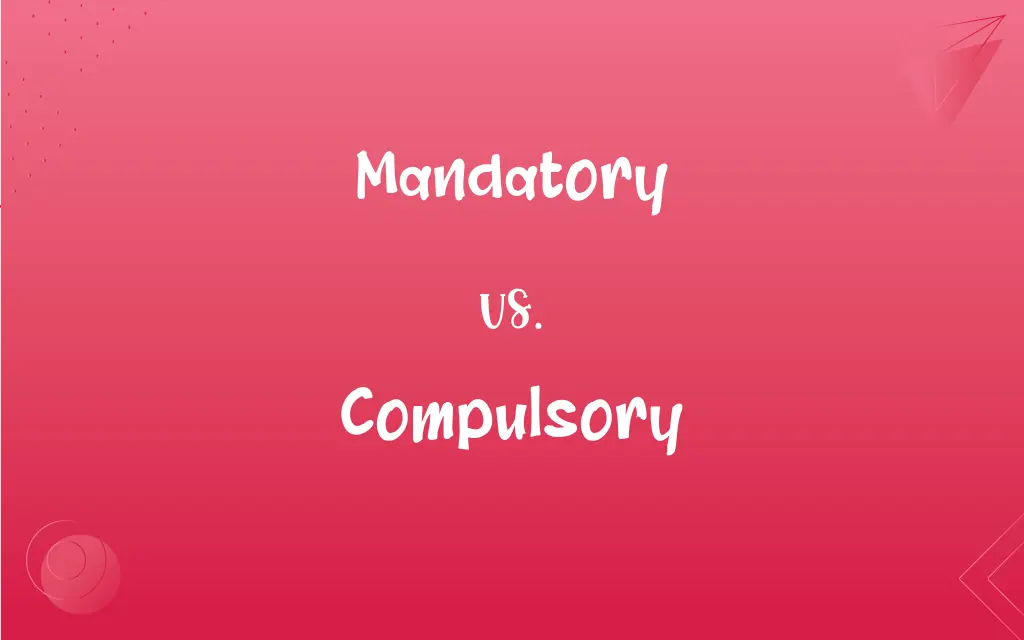Mandatory vs. Compulsory: What's the Difference?
Edited by Aimie Carlson || By Janet White || Updated on September 26, 2023
Mandatory and compulsory both refer to an obligation or requirement that must be fulfilled. They are often used interchangeably, but mandatory usually emphasizes the imposition of duty by an authority, while compulsory often implies enforcement by law.

Key Differences
Mandatory and compulsory are terms that dictate a necessity, signifying that something is obligatory and is not optional. Mandatory is a word often used in a broad context to convey that a certain action or obligation is required by rules, laws, or regulations, imposed by an authority like an organization or government. It highlights the imposition of a duty or a requirement. On the other hand, compulsory typically refers to a requirement that is enforced by law, and it usually pertains to formal and legal contexts, implying that non-compliance may result in penalties or legal consequences.
In contexts like education, the term compulsory is commonly used. For instance, a compulsory subject is one that students are required by the law or the curriculum to study. The emphasis here is on the enforcement by law or a governing body. In contrast, mandatory might be used to describe tasks or requirements within an organizational setting that are imposed by the policies of the organization. For example, a mandatory meeting implies that attendance is required by the organization's policies, and non-attendance may have consequences.
While both terms are often used interchangeably, mandatory might be perceived as somewhat less forceful than compulsory. The term mandatory often implies a requirement set forth by an authority, which can be an individual or an organization, and might not always carry legal binding. Conversely, compulsory tends to be associated more with statutory requirements and often implies a stronger legal obligation, emphasizing adherence to laws or regulations, with legal repercussions in case of non-compliance.
A mandatory action or condition can be seen as something required by circumstances or a controlling authority, placing emphasis on the entity imposing the requirement. For example, wearing a uniform can be mandatory in certain workplaces. Compulsory, meanwhile, denotes something that is obligatory because it is prescribed by law or a rule. For instance, in many countries, education is compulsory until a certain age, stressing the legal requirement and formal obligation for children to attend school.
Comparison Chart
Imposition By
Can be by authority, organization, or law.
Typically by law.
ADVERTISEMENT
Emphasis
On imposition of duty or requirement by an authority.
On enforcement by law.
Common Usage
In organizational or broad contexts.
In formal or legal contexts.
Forcefulness
Perceived as somewhat less forceful.
Associated with stronger legal obligation.
Legal Binding
Might not always carry legal binding.
Typically carries legal binding.
Mandatory and Compulsory Definitions
Mandatory
Compulsorily imposed, not optional.
Filing a tax return is mandatory for individuals with an income above a certain threshold.
ADVERTISEMENT
Compulsory
Imposed as a legal obligation.
It is compulsory to have car insurance to drive.
Mandatory
Required by laws or rules.
Attendance at the training session is mandatory for all new employees.
Compulsory
Demanded by circumstances or order; not optional.
Learning mathematics is compulsory in many educational systems.
Mandatory
Imposed as an obligation or duty by an authority.
Wearing safety gear is mandatory when operating heavy machinery.
Compulsory
Legally enforced as obligatory, carrying legal repercussions for non-compliance.
Attending school is compulsory for children under a certain age.
Mandatory
Enforced as a precondition or prerequisite.
Passing the entrance exam is mandatory for admission to the university.
Compulsory
Enforced by authority and not to be avoided; mandatory.
Military service is compulsory in certain nations.
Mandatory
Obligatory due to the mandates or dictates of an authority.
It is mandatory to follow the company's code of conduct while at work.
Compulsory
Required by law or a rule; obligatory.
Voting is compulsory in some countries.
Mandatory
Required or commanded by authority; obligatory
Attendance at the meeting is mandatory.
Compulsory
Obligatory; required
A compulsory examination.
Mandatory
Of, having the nature of, or containing a mandate.
Compulsory
Employing or exerting compulsion; coercive.
Mandatory
Holding a League of Nations mandate over a territory.
Compulsory
An element, such as a dive or school figure, required of all competitors in an athletic competition.
Mandatory
A mandatary.
Compulsory
Required; obligatory; mandatory.
The ten-dollar fee was compulsory.
Mandatory
Obligatory; required or commanded by authority.
Attendance at a school is usually mandatory for children.
Compulsory
Having the power of compulsion; constraining.
Such compulsory measures are limited.
Mandatory
Of, being or relating to a mandate.
Mandatory Palestine
Compulsory
Something that is compulsory or required.
Mandatory
(disc golf) A sign or line that require the path of the disc to be above, below or to one side of it.
Compulsory
Having the power of compulsion; constraining.
Mandatory
A person, organisation or state who receives a mandate; a mandatary.
Compulsory
Obligatory; enjoined by authority; necessary; due to compulsion.
This contribution threatening to fall infinitely short of their hopes, they soon made it compulsory.
Mandatory
Containing a command; preceptive; directory.
Compulsory
Required by rule;
In most schools physical education are compulsory
Attendance is mandatory
Required reading
Mandatory
Obligatory; compulsory; required by authority.
Mandatory
Not optional; not able to be modified or disregarded; as, seven mandatory clauses in the contract.
Mandatory
Same as Mandatary.
Mandatory
The recipient of a mandate
Mandatory
A territory surrendered by Turkey or Germany after World War I and put under the tutelage of some other European power until they ar able to stand by themselves
Mandatory
Required by rule;
In most schools physical education are compulsory
Attendance is mandatory
Required reading
FAQs
Can mandatory and compulsory be used interchangeably?
Often yes, but mandatory emphasizes imposition by authority, and compulsory implies enforcement by law.
Is compulsory always legally binding?
Typically, compulsory implies a legal obligation with potential legal repercussions for non-compliance.
Is education compulsory in many countries?
Yes, education is compulsory in many countries up to a certain age.
Can organizational policies make something mandatory?
Yes, organizations can impose mandatory policies, rules, or requirements.
Do compulsory actions have repercussions?
Typically, non-compliance with compulsory actions has repercussions, often legal in nature.
Can something be mandatory without legal binding?
Yes, something can be mandatory due to rules or policies without being legally binding.
Is a mandatory meeting legally binding?
Not usually, it’s typically enforced by organizational policy, not law.
Is attending school compulsory worldwide?
While many countries have compulsory education laws, it is not universally applied or enforced worldwide.
Can something be compulsory without a legal basis?
Generally, compulsory implies a legal basis, but it can also refer to something strictly required by rules or necessity.
Are mandatory requirements always non-negotiable?
Generally, mandatory requirements are non-negotiable as they are imposed by an authority or a policy.
Is compulsory voting common?
Compulsory voting is implemented in some countries, but it is not universally common.
What can be compulsory besides education?
Military service, vaccinations, and insurance are examples of compulsory requirements in some places.
Are there penalties for not complying with mandatory requirements?
Yes, non-compliance with mandatory requirements can result in penalties, often outlined by the imposing authority.
Can mandatory actions be optional?
By definition, mandatory actions are not optional and are required.
About Author
Written by
Janet WhiteJanet White has been an esteemed writer and blogger for Difference Wiki. Holding a Master's degree in Science and Medical Journalism from the prestigious Boston University, she has consistently demonstrated her expertise and passion for her field. When she's not immersed in her work, Janet relishes her time exercising, delving into a good book, and cherishing moments with friends and family.
Edited by
Aimie CarlsonAimie Carlson, holding a master's degree in English literature, is a fervent English language enthusiast. She lends her writing talents to Difference Wiki, a prominent website that specializes in comparisons, offering readers insightful analyses that both captivate and inform.






































































